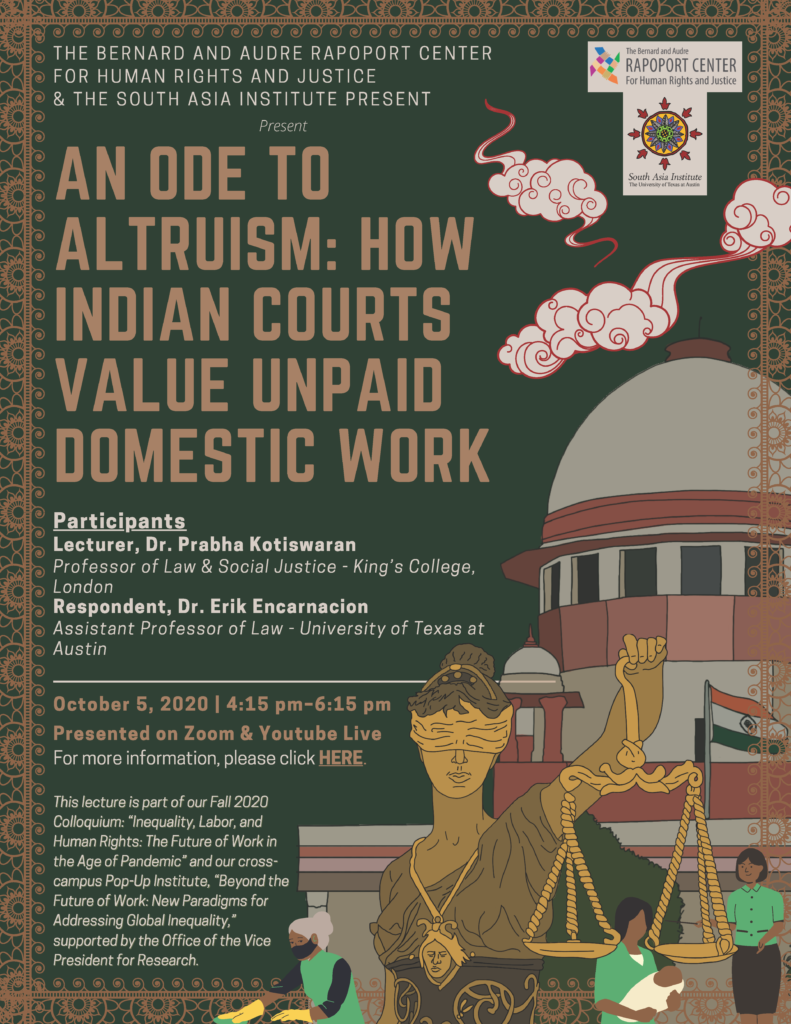
Dr. Prabha Kotiswaran: “An Ode to Altruism: How Indian Courts Value Unpaid Domestic Work”
- Prabha Kotiswaran Professor of Law & Social Justice, King’s College London
This was the second lecture in our Fall 2020 Colloquium, “Inequality, Labor, and Human Rights: The Future of Work in the Age of Pandemic,” part of the interdisciplinary and cross-campus Pop-Up Institute, “Beyond the Future of Work: New Paradigms for Addressing Global Inequality,” supported by the Office of the Vice President for Research.
Abstract: Unpaid domestic and care work (UDCW) have long captured the imagination of feminists who have extensively theorized how its invisibility and lack of recognition result in gender inequality and women’s disempowerment. This focus on UDCW performed at home has now received a new lease of life with the adoption of the Sustainable Development Goals, particularly SDG 5.4. In these discussions on social reproduction however, little attention has been paid to the role of the law in the recognition and redistribution of UDCW. Discussions of the law, where evident, are confined to the recognition of UDCW within family law through a community property regime at divorce. I examine the recognition of UDCW at another point of rupture, namely the death of a housewife through the lens of tort law. Through a review of compensation amounts awarded to the dependents of housewives over a fifty year period between 1968 and 2019 under the Indian Motor Vehicles Act, 1988, I trace the growing recognition of women’s UDCW by Indian appellate courts. This culminated in an influential Supreme Court decision in 2010 which has been widely followed by Indian High Courts, underlining judicial willingness to recognize the full range of UDCW performed by women within the home. I marshal what is effectively a “wages for housework” jurisprudence to probe the redistributive function of tort law on an inter-group and intra-group basis and ask how this jurisprudence can travel beyond tort law to other legal fields and influence current debates on women’s economic empowerment. Examining the archive of the law also has normative and methodological pay-offs for feminists in other disciplines in that it throws light on key concepts that feminists and social theorists have long worked with in attempting to have women’s UDCW recognized. I thus hope that it can in turn influence feminist debates on social reproduction.
Dr. Prabha Kotiswaran is Professor of Law & Social Justice at King’s College London. Her main areas of research include criminal law, transnational criminal law, sociology of law, postcolonial theory, and feminist legal theory. She is author of Dangerous Sex, Invisible Labor: Sex Work and the Law in India (Princeton University Press, 2011), which won the 2012 SLSA-Hart Prize for Early Career Academics, and co-author of Governance Feminism: An Introduction and Governance Feminism: Notes from the Field (with Janet Halley, Rachel Rebouché, and Hila Shamir) (University of Minnesota Press, 2019). She is a principal investigator of a five-year European Research Council Consolidator Grant on the Laws of Social Reproduction. Kotiswaran holds an LLM and a doctorate from Harvard Law School and an undergraduate law degree from the National Law School of India University, Bangalore, India.
Dr. Erik Encarnacion is Assistant Professor of Law at UT Austin. His research focuses on the moral foundations of private law, especially contract law, tort law, and more recently, the private law aspects of antidiscrimination law. His work appears in law reviews and peer-reviewed journals. Encarnacion completed a PhD in philosophy from the University of Southern California.
Respondents
- Erik Encarnacion Assistant Professor of Law
Supporters
The Office of the Vice President for Research; The South Asia Institute

